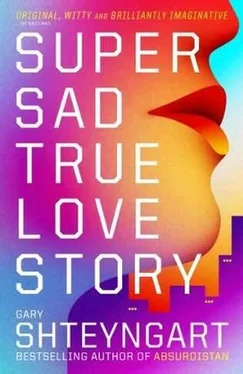“I hated her the most,” Eunice Park hissed. “She’s exactly who her parents want her to be and she’s so fucking proud of it. Oh, and forget about meeting my family. You’ll never meet them, Lenny. How can I trust you with them? You’ve blown it.”
I lay in my bed alone; Eunice again in the living room with her äppärät, with her teening and shopping, as the night turned black around us, as I realized, with a quiet gnawing pain, that when you took away my 239,000 yuan-pegged dollars, when you took away the complicated love of my parents and the mercurial comforts of my friends, when you took away my smelly books, I had nothing but the woman in the next room.
My mind was full of sickening Jewish worry, the pogrom within and the pogrom without. I declined to think of Fabrizia, Nettie, or the otter. I stayed in the moment. I tried to find out what was happening in Central Park to the Low Net Worth protesters. Some of the rich young Media people on Central Park West and Fifth Avenue were streaming from balconies and rooftops, and a few had broken through the National Guard cordons and were emoting from deep within the park itself. I looked past their angry and excited faces screeching about their parents and lovers and weight gain, trying to catch sight of the helicopters floating behind them, firing into the green heart of the city. I thought of Cedar Hill-the new ground zero of my life with Eunice Park-and considered the fact that it was now covered in blood. Then I felt guilty for thinking about my own life with such Media obsessiveness, so readily forgetting the ranks of the new dead. Grace was right. The times we live in.
But one thing I knew: I would never follow Nettie’s advice. I would never visit those poor people in Tompkins Square Park. Who knew what would happen to them? If the National Guard shot people in Central Park, why wouldn’t they shoot them downtown? “Safety first,” as they say around Post-Human Services. Our lives are worth more than the lives of others.
An armada of helicopters flew north. The whole building shook with their ferocity, china jiggling in the neighbor’s kitchen cabinet, little children crying. That seemed to scare Eunice, and soon she was in bed next to me, trying to find a comforting fit with my larger body, pressing so deeply into me that it hurt. I felt scared, not because of the military operation outside (in the end, they would never hurt people with my assets), but because I knew that I could never leave her. No matter how she treated me. No matter how bad she made me feel. Because in her anger and anxiety there was familiarity and relief. Because I understood those greenhorn southern-Californian immigrant families better than I could Grace’s right-hearted Midwestern kin, the craving for money and respect, the mixture of entitlement and self-loathing, the hunger to be attractive, noticed, and admired. Because after Vishnu told me that Grace was pregnant (“ha- huh ,” he laughed awkwardly while bearing the news) I realized that the last door had closed for me. Because, unlike the slick and sly Amy Greenberg, Eunice had no idea what the hell she was doing. And neither did I.
Sorry, diary, I’m such an emotional wreck today. Bad night’s sleep. Even my best ear plugs can’t help against the sound of rotor blades outside and Eunice mumbling loud Korean deprecations in her sleep, continuing her never-ending conversation with her appa , her father, the miscreant who is responsible for most of her pain, but without whose angry lashings I probably would never have fallen in love with her, or she with me.
But I realize that I’m also leaving some things out, diary. Let me describe some of the beautiful moments, at least before the LNWI riots started and the checkpoints went up by the F train.
We go to midtown Korean restaurants and feast on rice cakes swaddled in chili paste, squid drowning in garlic, frightening fish bellies bursting with salty roe, and the ever-present little plates of cabbages and preserved turnips and seaweed and chunks of delectable dried beef. We eat in the Asian fashion, eyes on our food, hearty slurps of tofu stew and little belches indicating our involvement with the meal, my hand reaching for a glass of alcoholic soju , hers for a dainty cup of barley tea. A peaceful family. No need for words. We love each other and feed each other. She calls me kokiri and kisses my nose. I call her malishka , or “little one” in Russian, a dangerous word only because it once spilled out of my parents’ mouths, back when I was under three feet tall and their love for me was simple and true.
And the warmth of a Korean restaurant, the endless procession of plates, as if the meal cannot end until the whole world is eaten, the shouting and laughter after the meal is done, the unchecked inebriation of the older men, the giggly chatter of the younger women, and everywhere the ties of the family. It’s no wonder for me that Jews and Koreans jump so easily into romantic relations. We were stewed in different pots, to be sure, but both pots are burbling with familial warmth and the easiness, nosiness, and neuroticism that such proximity creates.
While we were lunching at one of the louder places on 32nd Street, Eunice saw a man eating by himself and sipping a Coca-Cola. “It’s so sad,” Eunice said, “to see a Korean man without a wife or girlfriend to tell him not to drink that junk.” She lifted up her cup of barley tea as if to show him a healthier alternative.
“I don’t think he’s Korean,” I said to Eunice. “My äppärät says he’s from Shanghai.”
“Oh,” she said, losing interest as soon as her bloodlines to the solitary Asian Coca-Cola drinker were cut.
When we were walking home, our stomachs filled with garlic and chili, the summer heat without and the pepper heat within covering our bodies with a lovely sheen, I started to ponder what Eunice had said. It was sad, according to her, that the Asian man did not have a wife or girlfriend to tell him not to drink the Coca-Cola. A grown man had to be told how to behave. He needed the presence of a girlfriend or wife to curb his basest instincts. What monstrous disregard for individuality! As if all of us didn’t lust, on occasion, for a drop of artificially sweetened liquid to fall upon our tongues.
But then I started thinking about it from Eunice’s point of view. The family was eternal. The bonds of kinship could never be broken. You watched out for others of your kind and they watched out for you. Perhaps it was I who had been remiss, in not caring enough for Eunice, in not correcting her when she ordered garlicky sweet-potato fries or drank a milkshake without the requisite vitamin boost. Wasn’t it just yesterday, after I had commented on our age difference, that she had said, quite seriously, “You can’t die before me, Lenny.” And then, after a moment’s consideration: “Please promise me that you’ll always take care of yourself, even when I’m not around to tell you what to do.”
And so, walking down the street, our breath ponderous with kimchi and fizzy OB beer, I began to reconsider our relationship. I started to see it Eunice’s way. We now had obligations to each other. Our families had failed us, and now we had to form an equally strong and enduring connection to each other. Any gap between us was a failure. Success would come when neither of us knew where one ended and the other began.
With that in mind, I crawled on top of her when we had reached home and pressed myself against her pubic bone with great urgency. “Lenny,” she said. She was breathing very quickly. I’d known her for a month, and we had still not consummated our relationship. What I had seen as a sign of great patience and traditional morality on my part I now saw as a failure to connect.
Читать дальше












